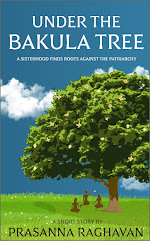Kethan Bhagat, one of the India's bestseller authors, answered in an interview; he writes for changing people's perspective.
He's right. Writers are mainly the people who deal with emotions, and only emotions or feelings can change people's perspectives or views. And how can this be possible for writers, if they aren't allowed creative freedom, and tethered at the end of limited expressions? The individuals and the society as a whole get to with only stale or outdated ideas.
And many of us are comfortable with outdated ideas because they make life easy, frictionless, and having little challenges. And they don't call it stale, but traditional. The majority of us are conditioned to treat anything that comes under the label of tradition with outright awe and respect, if not we fear stigma for supporting immorality. But the fact of the matter is that what often comes as traditional has nothing to do with tradition but the selected ideologies of a minority that only wants to control the mindset of the majority. That they often come from the structures of political and religious authority is not accidental.
One such instance is the stigmas that got attached to Perumal Murugan for writing his novel,'One Part Woman.' It happened last year.
The volatile situation had led to instituting a criminal case against him for allegedly offending religious sentiments of traditionalists. But last week, July 5, the Madras High Court made a remarkable ruling in his favour, citing the importance of safeguarding the literary freedom of the author. "If you don't like a book, throw it way," was an important statement of the judgement. For a full read of it go here.
It has also quashed a plea moved by the residents of Trechencore, Tamil Nadu, to initiate criminal charges against him, who had ousted him from the place where he was lecturing in a college.
The judgement is historical not only regarding safeguarding the interest of Perumal Murugan but also in setting up guidelines for the State to follow incase such a case arrives in future. There are the five guide lines.
The important points in these guidelines are:
1. Presumption in favor of free speech. This is a constitutional guaranteed under normal circumstances. This presumption must be kept in mind if there are ccomplaints against publications, art, drama, film, song, poem, cartoons or any other creative expressions.
2. Expert pannels consisting of qualifed individuals should be constituted to deal with such complainsts so that only police authorities or local administrations alone deal with the matters.
3.Police protection for authors.
4 There is a need for conducting regular programmes for sensitising officials for dealing with such issues.
So, who should judge a literary product? It should be the readers. Let them read and change their perspectives. Changing perspective for better is an important incentive for societal upliftment and nation building.
Day 1 for the Write Tribe Festival of Words #5









10 comments
Hear hear! Glad that the court made a judgement in favour of Perumal Murugan, it was sad to know about his decision to quit. Agree with you, the readers should be the judge. They must but have a broader mindset to accept anybody's free opinion.
ReplyDeleteAbsolutely: a man was ousted from his job and his home for writing a novel. I hope his adversaries will have a change of heart. Thanks a lot for reading my post.
DeleteHappy writing
Court did the right thing. Freedom of expression is a must cos without that things would be so mundane. And yes, the readers need to be the ultimate judge of any work.
ReplyDeleteYeah, what a tragedy would it have been if the judgement was otherwise. That is it, let the readers judge him, which they have already done.
DeleteThanks a lot Parul for reading my post and commenting.
Happy Writing
READERS RULE!!!!!!!
ReplyDeleteHi Brenda, yeah but somebody wishes to decide what the readers should read. Sad!!. Thanks for the read and the comment.
DeleteHappy Writing
Writers can change the world!
ReplyDeleteOf course, but there are some who keeps an aversion towards changes.
DeleteThanks for the read and the comment
Happy Writing
"If you don't like a book, throw it away." I love that. So happy for this outcome.
ReplyDeleteOh yes, the judgement was a remarkable one.
DeleteThanks a lot for the read and the comment
Happy Writing
Post a Comment